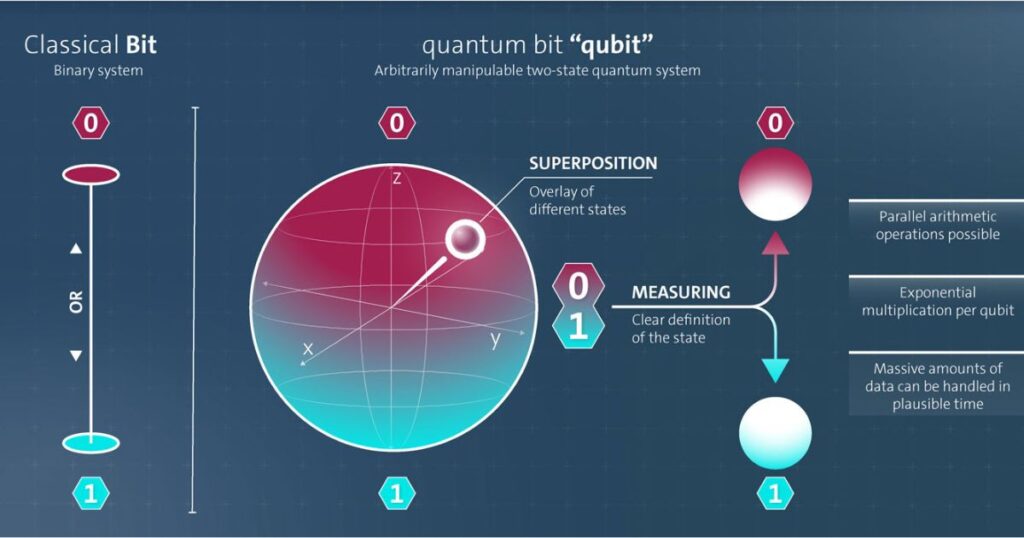Our current computers are hitting a wall. They struggle with certain complex problems that are crucial for scientific breakthroughs and technological advancements.
As our world becomes more complicated, we need to solve bigger and tougher challenges. Regular computers might not be able to keep up, which could slow down progress in important areas like medicine, climate science, and artificial intelligence. We risk falling behind in crucial research and innovation.
The concept of this revolutionary technology originated in the 1980s. Richard Feynman, a renowned physicist, first proposed the idea. He envisioned machines that could simulate quantum systems more effectively than classical processors.
Fundamentals of Quantum Mechanics in Computation
This groundbreaking field is rooted in quantum mechanics. This branch of physics deals with subatomic particles. It describes the behavior of matter and energy at the molecular level. In the quantum realm, entities can exist in multiple states simultaneously. This phenomenon is known as superposition. Additionally, particles can be interconnected in fascinating ways, a concept called entanglement.
These advanced systems use quantum bits, or qubits. These differ significantly from classical bits. Traditional bits can only be 0 or 1. However, qubits can be 0, 1, or both at once, thanks to superposition. This property allows for parallel computations on an unprecedented scale.
Quantum gates are another crucial component. These are analogous to logic gates in classical systems. However, quantum gates can perform operations that their classical counterparts cannot. They can create and manipulate quantum states, enabling the solution of certain problems at remarkable speeds.
Hardware for Quantum Processing
Various approaches exist for constructing these futuristic machines. Some utilize superconducting circuits, operating at extremely low temperatures. Others employ trapped ions, which are atoms held in place by lasers. Each method has its unique advantages and challenges.
Currently, these advanced processors are still in their infancy. The most powerful ones contain around 100 qubits. While impressive, this is insufficient for practical applications. However, tech giants and startups alike are racing to develop larger and more stable systems.
Also Read: Classroom 6X: Revolutionizing Education for the 21st Century
Software and Algorithms for the Quantum Age
Researchers have developed specialized programming languages for these next-gen computers. These tools help create quantum algorithms. Popular examples include Qiskit, Cirq, and Q#. They allow programmers to harness the power of quantum systems effectively.
Several groundbreaking algorithms have already been developed. Shor’s algorithm, for instance, can factorize large numbers exponentially faster than classical methods. This could have significant implications for cryptography. Grover’s algorithm offers a quadratic speedup for searching unsorted databases. These innovations highlight the immense potential of quantum-based computation.
Real-World Applications
This emerging technology could revolutionize numerous fields. In cryptography, it might render current encryption methods obsolete while paving the way for unbreakable quantum encryption.
In pharmaceutical research, these advanced systems could simulate molecular interactions with unprecedented accuracy. This could accelerate drug discovery and the development of new materials.
The financial sector stands to benefit from optimized portfolio management and more precise risk analysis. This could lead to more informed financial strategies and decisions.
Artificial intelligence could also see a significant boost. Quantum-enhanced machines could process vast datasets at incredible speeds, potentially leading to more sophisticated AI systems.
Overcoming Hurdles
Developing practical quantum systems presents significant challenges. One major obstacle is decoherence, where qubits lose their quantum properties due to environmental interactions. Scientists are exploring various methods to mitigate this issue.
Error correction is another crucial area of research. Quantum states are inherently fragile, and even minor errors can derail calculations. Researchers are developing techniques to detect and correct these errors, though this remains a complex problem.
Scalability also poses a significant challenge. Adding qubits increases system complexity exponentially and amplifies the likelihood of errors. Finding ways to build larger, more stable quantum systems is a key focus for researchers.
The Future of Quantum Computing

Experts predict continued advancements in this field. In the coming years, we may see systems with thousands of qubits, capable of tackling real-world problems. Some forecast that by 2030, these advanced computers might be able to crack current encryption methods.
Long-term, this technology could transform numerous industries. It could catalyze the creation of new medicines and materials, optimize logistics networks, and enhance our understanding of climate change. The possibilities are both exciting and unpredictable.
Preparing for a Transformed Landscape
As this technology matures, many sectors will need to adapt. Companies should start familiarizing themselves with quantum concepts now, considering potential impacts on their operations.
Governments worldwide are also gearing up for this new era. Many countries are investing heavily in research and preparing for the security implications of quantum-enhanced computation.
Individuals can also prepare for this shift. Understanding the basics of quantum theory could become increasingly valuable across various professions.
Ethical Considerations
This emerging field raises important ethical questions. It could potentially render current encryption methods obsolete, posing threats to privacy and data security. We must consider how to protect sensitive information in this new landscape.
The combination of quantum technology and artificial intelligence also warrants careful consideration. Extremely powerful AI systems could raise complex ethical issues that need to be addressed proactively.
Another concern is the potential for a technological divide. These advanced systems are extremely costly, potentially limiting access to large corporations and wealthy nations. This could exacerbate existing inequalities in technological access.
Conclusion
This new way of computing is very exciting. It might help us solve big problems in the world. But it’s still hard to make quantum computers work well. Even though it’s difficult, these computers could change many things. They might help us make new medicines or understand weather better. It’s good to learn about these new computers. They’ll probably be very important in the future.


